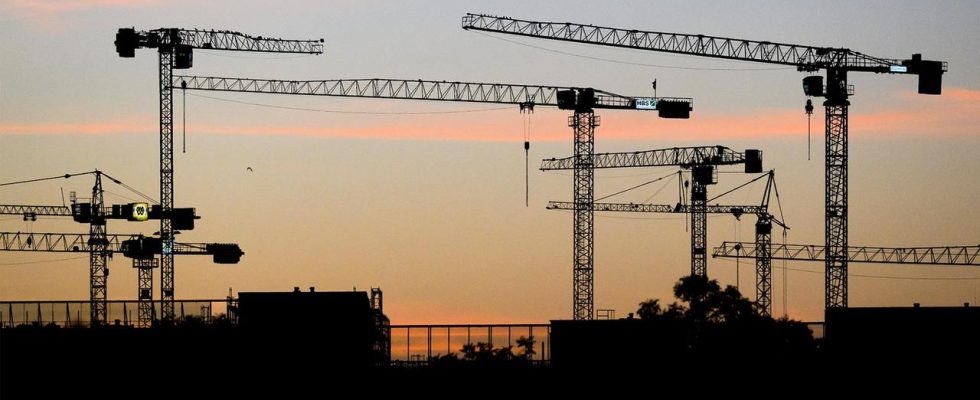Several hundred thousand apartments are missing in Germany. Experts warn: The market is in a downward spiral that will last for years. This means poor prospects for many tenants too.
André Kasimir stands in a backyard in Berlin-Charlottenburg. Next to him, his employees are pouring concrete into a construction pit. Exactly what Berlin’s city planners have been demanding for years is happening here: densification. Plots of land that have already been developed will be filled even more densely with buildings, in other words “re-densified”. In this case, a new house with condominiums is being built here in the courtyard.
The order situation is currently still good. But now, in November, it is also foreseeable that 2024 will be leaner. “We just notice that incoming orders are decreasing significantly and we will have significantly less sales next year. And in 2025 and for the foreseeable future it will be even less,” says Kasimir.
Building is less likely to pay off
The reason for Kasimir’s pessimism: The number of building applications is declining nationwide, and some projects that have already been approved are being canceled. Inflation and increased interest rates too often make investments unprofitable. Calculations that looked good two years ago are simply no longer valid. According to a survey by the Ifo Institute, almost every second company now complains about a decline in orders; More than one in five even reported cancellations of orders that had already been placed.
For some of the 90 employees in Kasimir’s company, their career prospects have darkened within a very short time: “This will certainly mean that you will have to register for short-time work, sooner or later.” Kasimir expects me to have 20 percent fewer orders in the coming year. 2025 will then bring another decline of a similar magnitude.
From the construction crisis into the rent crisis
The crisis in construction is likely to soon have an impact on the housing market – for both owners and tenants. Reiner Braun from the empirica research institute says that the current situation is leading to a number of unwanted consequences. And: There isn’t much you can do about it. “What is currently happening is a drama in slow motion. It is completely clear that the number of new buildings will continue to collapse over the next two or three years – and rents will continue to rise to the same extent,” said Braun.
His institute has just published the quarterly “Bubble Index”. Result: A scenario in which a real estate bubble will soon burst in a major German city is rather unlikely. Instead, several effects can be observed that are likely to cement the housing problem: There are already structurally too few apartments, especially in large cities. The gap between supply and demand threatens to become significantly larger due to the construction slowdown. This drives up rents, especially for new rentals.
Hardly any moves anymore
However, existing tenants only have to expect rent increases within the legal framework. “The result is that the difference between new contract rents and existing rents is getting bigger and bigger. There is really a big gap there. New contract rents are often twice as high as existing rents,” says Braun.
It is simply becoming less and less attractive to terminate your old rental agreement and sign a new one. This is called the “lock-in effect”. The result is that living space is distributed more and more ineffectively – and the number of available apartments on the market continues to decline: a self-reinforcing effect.
And the solution? There’s not much you can do in the short term, says Braun. In the medium term it would help if construction costs fell. The state could indirectly adjust the tax screws. Braun’s suggestion: eliminate the real estate transfer tax that applies when buying building land. Instead, the property tax that is paid annually would have to be doubled.
Too many regulations
It’s a zero-sum game for the state and a catalyst for the housing market, says Braun. Building land would become cheaper, but housing would initially be a little more expensive in the long term – because a higher property tax would be charged every year. The main reason for high rents in metropolitan areas is construction costs and, above all, the shortage of living space.
Ulrich Schiller, managing director of the state-owned housing association HOWOGE in Berlin, sees another possibility for reducing construction costs: “We have to revise building regulations that are extremely expensive and excessive. These also ensure that construction costs are so high. I would suggest the building standards of the countries next to each other and see: Where can you get by with fewer regulations? And that could then be standardized,” said Schiller.
HOWOGE builds on behalf of the public – and plans to continue to do so, despite increased construction costs and interest rates. 25,000 new apartments are to be added to the 75,000 existing units in the “medium to long term”. But the construction crisis is not leaving public housing companies unscathed either. “I assume that our company will also realize slightly lower numbers of new buildings in the coming years,” says Schiller. How many apartments the company will actually build in the next few years also depends on how the market situation develops.

